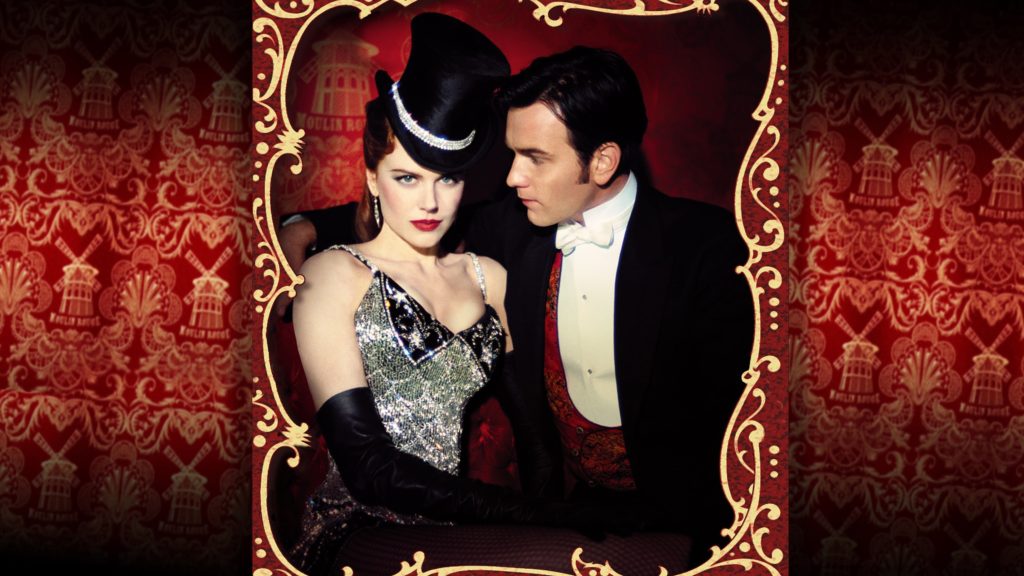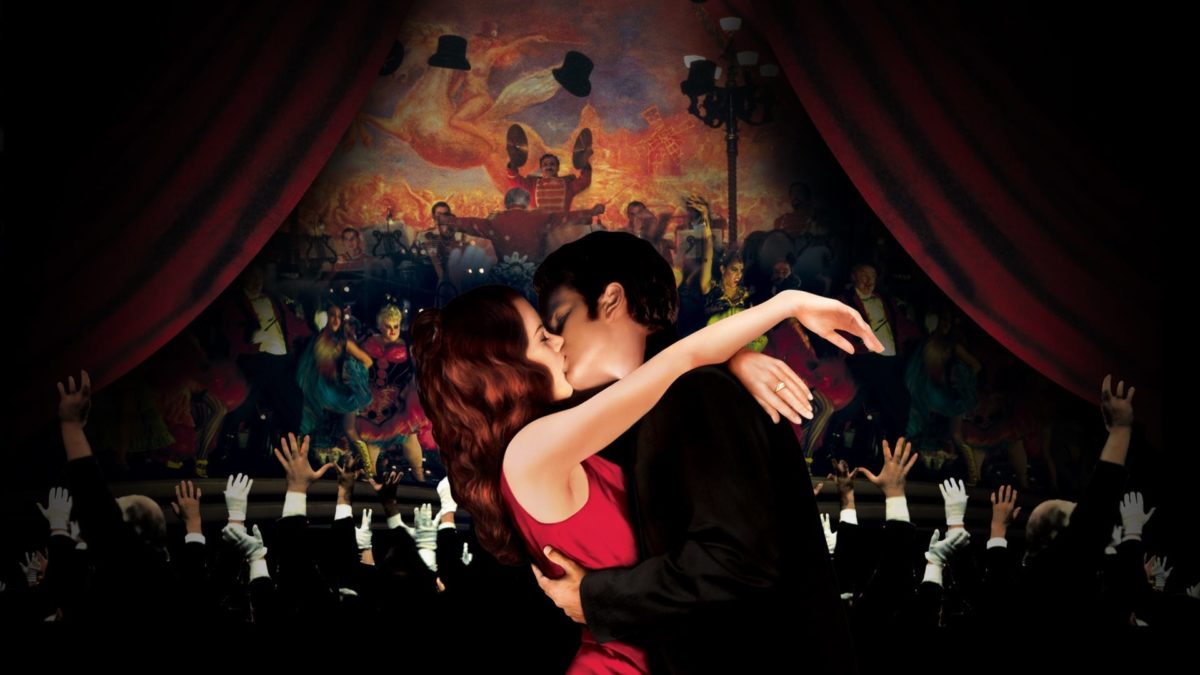I hope you don't mind
Following Romeo + Juliet’s attempt at capturing the spirit of Shakespeare’s play through a modern lens, Australian director Baz Luhrmann moved onto another outdated entertainment institution to revitalize: Parisian burlesque theater. He and his frequent collaborator Craig Pearce wrote a jukebox musical featuring music from the late 20th century but set in 1900.
The end result, Moulin Rouge! (third in the so-called “Red Curtain Trilogy,” along with Strictly Ballroom and Romeo + Juliet), brings Luhrmann’s visual style to its logical endpoint. The editing is hyperkinetic; the colors faux-Technicolor; the sets intricately constructed dollhouses. It is an intoxicating film to look at: There are dozens of flying zooms and sweaty close-ups. The incredible production designs include more swishing, luscious fabrics than you can count. The film’s outlines are all dark, as we’re experiencing the seedy life of night-people: entertainers and prostitutes and party-goers. Those dark edges make the visuals pop even more off the screen.

The story, on a surface level, is a straightforward melodrama: A poor man, Christian (Ewan McGregor), falls for Satine (Nicole Kidman), a dancer at a club, who is coveted by a powerful duke (Richard Roxburgh). Through much tribulation, true love prevails… only for the woman to perish from sickness moments later, leaving the poor man alone and heartbroken at his moment of romantic triumph.
But it’s all wrapped up in layers of meta-commentary and reflexive artifice. Christian is writing a play in which Satine is the lead actress, and he uses the on-stage story as an outlet to express his love. There’s one nested layer beyond that, which is that we’re hearing this story as told by Christian in a memoir. This structure of play-in-a-story-in-a-movie, in addition to the showy visual style and anachronistic pop selections, build a sensation that we’re watching a heightened, subjective narrative.
To some extent, you could say the same thing about Romeo + Juliet: That film also called attention to the very act of its storytelling thanks to the juxtaposition of Elizabethan-era English into trashy mid-90s Miami.
The difference, though, is that Romeo + Juliet used its techniques as a means to tell a hyper-dramatic Shakespearean tragedy of doomed love; Moulin Rouge! uses them to tell a big romantic farce. I really wanted to love this movie for all of its visual audacity and extravagance, for unleashing Luhrmann’s uninhibited vision. But it’s just too dang silly for me.
Watching Moulin Rouge! is the equivalent of hanging out with a group of theater kids in high school. It’s so exhausting and showy, so hell-bent on proving it’s creative and funny, for me to ever settle in and have a good time.
Part of the problem is that I never found the jukebox musical elements to be all that satisfying. The numbers are filmed with relentless energy, for sure; but energy is not the same thing as enjoyment or profundity. The love spark scene is scored to “Your Song,” which is perhaps the single most trite option in the whole oeuvre of pop music. The film adds minimal interpretation or rearrangement to the overplayed radio hit; it takes the same face-value emotions that Elton John sang about in 1970 and delivers them from McGregor’s mouth unchanged.
Other numbers similarly fail to do anything expansive or elucidating with their source songs. There’s some fun in the arrangements, which are occasionally packaged into surprising medleys (e.g. “Smells Like Teen Spirit” with LaBelle’s “Lady Marmalade”) that make for fun ear candy of little insight. “Like a Virgin” probably bothered me more than any other, because it at least had the interpretive idea of framing it from a horny man’s perspective; and yet, it fails to do anything with that idea other than hammer it over and over again for three minutes.

The movie does pull together a little bit towards the end as it spirals towards its tragic finale and it sheds some of its quirkiness. I wouldn’t exactly call the conclusion a gut punch, but it is brilliantly constructed by Luhrmann as the various layers of artifice collapse on top of each other and the emotions of the in-film drama merge.
The cast is also pretty tremendous: Kidman is absolutely terrific, navigating the film’s tone and still managing to construct a figure of charm and pathos. McGregor is also very good, bringing more pipes than I ever would have expected, and giving good puppy-dog expressions from start to finish. (According to Wikipedia, Heath Ledger was considered for the role; good as McGregor is, I wish we could have seen that version of this film.) The supporting performances, including Roxburgh and a Muppet-esque Jim Broadbent, are great, too.
I came into Moulin Rouge! with massive expectations; it has long been hyped by fans as the peak of the Baz Luhrmann experience. And it does indeed provide a top tier sugar rush in its most exciting scenes. But in terms of using all that energy for a worthy story, it’s my least favorite of his first three films. I still give it a gentle recommendation on the basis of its sheer creativity and charming performances, but only barely.
- Review Series: Baz Luhrmann
Is It Good?
Good (5/8)
Dan is the founder and head critic of The Goods. Follow Dan on Letterboxd. Join the Discord for updates and discussion.

